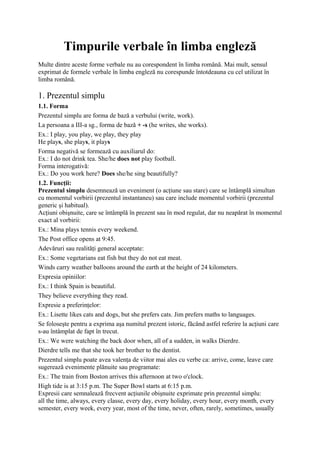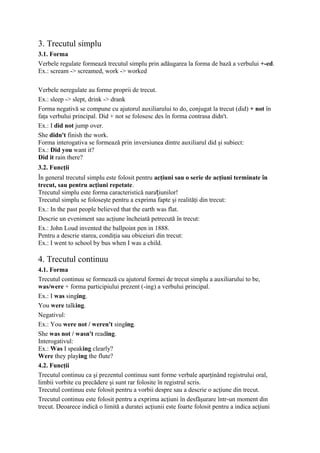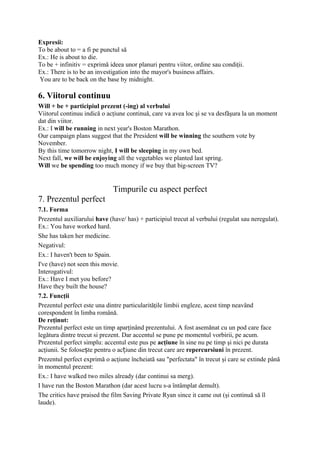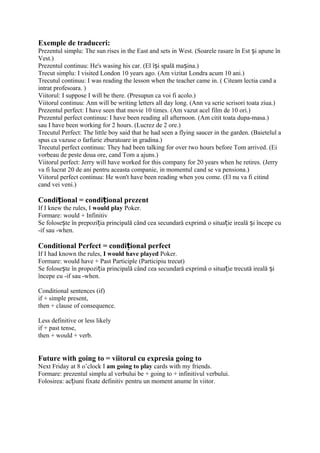Limba engleza
- 1. Timpurile verbale ÃŪn limba englezÄ Multe dintre aceste forme verbale nu au corespondent ÃŪn limba romÃĒnÄ. Mai mult, sensul exprimat de formele verbale ÃŪn limba englezÄ nu corespunde ÃŪntotdeauna cu cel utilizat ÃŪn limba romÃĒnÄ. 1. Prezentul simplu 1.1. Forma Prezentul simplu are forma de bazÄ a verbului (write, work). La persoana a III-a sg., forma de bazÄ + -s (he writes, she works). Ex.: I play, you play, we play, they play He plays, she plays, it plays Forma negativÄ se formeazÄ cu auxiliarul do: Ex.: I do not drink tea. She/he does not play football. Forma interogativÄ: Ex.: Do you work here? Does she/he sing beautifully? 1.2. FuncÅĢii: Prezentul simplu desemneazÄ un eveniment (o acÅĢiune sau stare) care se ÃŪntÃĒmplÄ simultan cu momentul vorbirii (prezentul instantaneu) sau care include momentul vorbirii (prezentul generic Åi habitual). AcÅĢiuni obiÅnuite, care se ÃŪntÃĒmplÄ ÃŪn prezent sau ÃŪn mod regulat, dar nu neapÄrat ÃŪn momentul exact al vorbirii: Ex.: Mina plays tennis every weekend. The Post office opens at 9:45. AdevÄruri sau realitÄÅĢi general acceptate: Ex.: Some vegetarians eat fish but they do not eat meat. Winds carry weather balloons around the earth at the height of 24 kilometers. Expresia opiniilor: Ex.: I think Spain is beautiful. They believe everything they read. Expresie a preferinÅĢelor: Ex.: Lisette likes cats and dogs, but she prefers cats. Jim prefers maths to languages. Se foloseÅte pentru a exprima aÅa numitul prezent istoric, fÄcÃĒnd astfel referire la acÅĢiuni care s-au ÃŪntÃĒmplat de fapt ÃŪn trecut. Ex.: We were watching the back door when, all of a sudden, in walks Dierdre. Dierdre tells me that she took her brother to the dentist. Prezentul simplu poate avea valenÅĢa de viitor mai ales cu verbe ca: arrive, come, leave care sugereazÄ evenimente plÄnuite sau programate: Ex.: The train from Boston arrives this afternoon at two o'clock. High tide is at 3:15 p.m. The Super Bowl starts at 6:15 p.m. Expresii care semnaleazÄ frecvent acÅĢiunile obiÅnuite exprimate prin prezentul simplu: all the time, always, every classe, every day, every holiday, every hour, every month, every semester, every week, every year, most of the time, never, often, rarely, sometimes, usually
- 2. 2. Prezentul continuu 2.1. Forma Acest timp se formeazÄ cu ajutorul verbului auxiliar to be la prezent + forma de bazÄ a verbului + -ing Ex.: I am buying all my family's Christmas gifts early this year. She is working through the holiday break. Forma negativÄ - se adaugÄ not dupÄ forma de prezent simplu a auxiliarului to be. Ex.: It is not raining. Forma interogativÄ se obÅĢine prin inversiunea auxiliarului to be cu subiectul: Ex.: Are they playing? Is he eating? 2.2. FuncÅĢii Prezentul continuu este folosit ÃŪn general pentru acÅĢiuni temporale (se vor termina la un moment dat) care se desfÄÅoarÄ ÃŪn momentul vorbirii Åi ÃŪn continuare. Prezentul continuu indicÄ o acÅĢiune care se aflÄ ÃŪn plinÄ desfÄÅurare ÃŪn momentul vorbirii. Ex.: The phone is ringing. I can't answer it. I'm washing my hair. It's raining so they have to stop the game. O acÅĢiune care se afla ÃŪn desfÄÅurare ÃŪn perioada prezentÄ, dar care poate nu se ÃŪntÃĒmplÄ concomitent cu momentul vorbirii. Ex.: They are writing a new book. She's studying English at the Language Center. Descrie o tendinÅĢÄ sau acÅĢiune care a debutat recent: Ex.: More and more people are starting to play golf in Malaysia. Pentru a desemna o acÅĢiune care este planificatÄ pentru viitor: Ex.: To meet the demand for English language courses, they are planning to expand. Mohan is leaving for London next week. 2.3. Verbele dinamice Åi statice Ãn general, numai anumite verbe pot fi folosite la aspectul continuu Åi acestea se numesc verbe dinamice. Aspectul continuu al unui verb aratÄ ca o acÅĢiune este, era sau va fi ÃŪn desfÄÅurare. Formele verbale progresive (aspectul continuu) se folosesc numai ÃŪn cazul verbelor dinamice, de miÅcare, care exprimÄ calitÄÅĢi capabile de schimbare. Nu se spune "He is being tall" sau "He is resembling his mother" sau "I am wanting spaghetti for dinner", ci vom spune: "He is tall", "He resembles his mother", "I want spaghetti". 2.4. De reÅĢinut Verbul to have nu se foloseÅte niciodatÄ ÃŪn aspectul continuu atunci cÃĒnd are sensul de "a suferi de": I have flu. He has a fever. Se foloseÅte la aspectul continuu atunci cÃĒnd are ÃŪnÅĢelesul de "a angaja pe cineva pentru o acÅĢiune": I'm having my hair done on Wednesday. They're having the house painted. Have se foloseÅte la aspectul continuu atunci cÃĒnd are sensul de "experienÅĢÄ": I'm having a lot of problems with this task. They're having trouble selling their house.
- 3. 3. Trecutul simplu 3.1. Forma Verbele regulate formeazÄ trecutul simplu prin adÄugarea la forma de bazÄ a verbului +-ed. Ex.: scream -> screamed, work -> worked Verbele neregulate au forme proprii de trecut. Ex.: sleep -> slept, drink -> drank Forma negativÄ se compune cu ajutorul auxiliarului to do, conjugat la trecut (did) + not ÃŪn faÅĢa verbului principal. Did + not se folosesc des ÃŪn forma contrasa didn't. Ex.: I did not jump over. She didn't finish the work. Forma interogativa se formeazÄ prin inversiunea dintre auxiliarul did Åi subiect: Ex.: Did you want it? Did it rain there? 3.2. FuncÅĢii Ãn general trecutul simplu este folosit pentru acÅĢiuni sau o serie de acÅĢiuni terminate ÃŪn trecut, sau pentru acÅĢiuni repetate. Trecutul simplu este forma caracteristicÄ nara iunilor!Č Trecutul simplu se foloseÅte pentru a exprima fapte Åi realitÄÅĢi din trecut: Ex.: In the past people believed that the earth was flat. Descrie un eveniment sau acÅĢiune ÃŪncheiatÄ petrecutÄ ÃŪn trecut: Ex.: John Loud invented the ballpoint pen in 1888. Pentru a descrie starea, condiÅĢia sau obiceiuri din trecut: Ex.: I went to school by bus when I was a child. 4. Trecutul continuu 4.1. Forma Trecutul continuu se formeazÄ cu ajutorul formei de trecut simplu a auxiliarului to be, was/were + forma participiului prezent (-ing) a verbului principal. Ex.: I was singing. You were talking. Negativul: Ex.: You were not / weren't singing. She was not / wasn't reading. Interogativul: Ex.: Was I speaking clearly? Were they playing the flute? 4.2. FuncÅĢii Trecutul continuu ca Åi prezentul continuu sunt forme verbale aparÅĢinÃĒnd registrului oral, limbii vorbite cu precÄdere Åi sunt rar folosite ÃŪn registrul scris. Trecutul continuu este folosit pentru a vorbii despre sau a descrie o acÅĢiune din trecut. Trecutul continuu este folosit pentru a exprima acÅĢiuni ÃŪn desfÄÅurare ÃŪntr-un moment din trecut. Deoarece indicÄ o limitÄ a duratei acÅĢiunii este foarte folosit pentru a indica acÅĢiuni
- 4. care au avut loc (trecut simplu) ÃŪn timp ce o altÄ acÅĢiune era ÃŪn desfÄÅurare, sau pentru a indica o acÅĢiune ÃŪn desfÄÅurare care este ÃŪntreruptÄ de o alta. Ex.: Carlos lost his watch while he was running. I was watching Oprah when John came in screaming. Exprima activitÄÅĢi din trecut: Ex.: Once I was driving through Kenya with a friend. Pentru a vorbi despre obiceiuri din trecut. Trecutul continuu este ÃŪnsoÅĢit ÃŪn acest caz de always. Ex.: Grace was always handing in late papers. My father was always lecturing my brother. Ãn general, numai anumite verbe pot fi folosite la aspectul continuu Åi acestea se numesc verbe dinamice. 5. Viitorul Ãn mod paradoxal, limba englezÄ nu are o formÄ ca atare a viitorului, dar idee de viitor se poate exprima ÃŪn nenumÄrate moduri. âĒ Will/ shall + infinitiv : He will be here at 5 o'clock. âĒ Be going to + infinitiv : She's going to buy a new computer. âĒ Prezentul continuu : The British Council is moving to a new building next year. âĒ Prezentul simplu : The train leaves at 7:15. 5.1. Forma Cea mai frecvent folositÄ modalitate de a exprima o acÅĢiune viitoare este cu ajutorul lui will/ shall sau a formei contractate a acestora 'll. Ex.: She will leave soon. We shall overcome. De reÅĢinut: Ãn engleza modernÄ forma shall este foarte puÅĢin utilizatÄ. Cea mai des folositÄ ÃŪn engleza vorbitÄ Åi scrisÄ ÃŪn registrul informal este forma 'll. Negativul: Ex.: I will not / won't finish. Interogativul: Ex.: Will you catch the ball? 5.2. FuncÅĢii Viitorul exprimÄ preziceri ale acÅĢiunilor viitoare sau interogaÅĢii despre viitor. Ex.: Computer technology will influence our future. Decizii care tocmai s-au luat Åi care nu au fost plÄnuite. Ex.: I'll finish this report tomorrow. Face promisiuni Ex.: I'll phone you tomorrow. Invita pe cineva la un eveniment, acÅĢiune Ex.: Will you come to my house on Sunday?
- 5. Expresii: To be about to = a fi pe punctul sÄ Ex.: He is about to die. To be + infinitiv = exprimÄ ideea unor planuri pentru viitor, ordine sau condiÅĢii. Ex.: There is to be an investigation into the mayor's business affairs. You are to be back on the base by midnight. 6. Viitorul continuu Will + be + participiul prezent (-ing) al verbului Viitorul continuu indicÄ o acÅĢiune continuÄ, care va avea loc Åi se va desfÄÅura la un moment dat din viitor. Ex.: I will be running in next year's Boston Marathon. Our campaign plans suggest that the President will be winning the southern vote by November. By this time tomorrow night, I will be sleeping in my own bed. Next fall, we will be enjoying all the vegetables we planted last spring. Will we be spending too much money if we buy that big-screen TV? Timpurile cu aspect perfect 7. Prezentul perfect 7.1. Forma Prezentul auxiliarului have (have/ has) + participiul trecut al verbului (regulat sau neregulat). Ex.: You have worked hard. She has taken her medicine. Negativul: Ex.: I haven't been to Spain. I've (have) not seen this movie. Interogativul: Ex.: Have I met you before? Have they built the house? 7.2. FuncÅĢii Prezentul perfect este una dintre particularitÄÅĢile limbii engleze, acest timp neavÃĒnd corespondent ÃŪn limba romÃĒnÄ. De reÅĢinut: Prezentul perfect este un timp aparÅĢinÃĒnd prezentului. A fost asemÄnat cu un pod care face legÄtura dintre trecut si prezent. Dar accentul se pune pe momentul vorbirii, pe acum. Prezentul perfect simplu: accentul este pus pe acÅĢiune ÃŪn sine nu pe timp Åi nici pe durata acÅĢiunii. Se folose te pentru o ac iune din trecut care areČ Č repercursiuni ÃŪn prezent. Prezentul perfect exprimÄ o acÅĢiune ÃŪncheiatÄ sau "perfectata" ÃŪn trecut Åi care se extinde pÃĒnÄ ÃŪn momentul prezent: Ex.: I have walked two miles already (dar continui sa merg). I have run the Boston Marathon (dar acest lucru s-a ÃŪntÃĒmplat demult). The critics have praised the film Saving Private Ryan since it came out (Åi continuÄ sÄ ÃŪl laude).
- 6. AcÅĢiuni sau evenimente din trecut care conduc pÃĒnÄ ÃŪn momentul prezent. Ãn acest caz, folosirea timpului prezent perfect aratÄ cÄ rezultatul evenimentului sau acÅĢiunii care aparÅĢine momentului prezent este cel care conteazÄ Åi nu momentul ÃŪn care a avut loc acÅĢiunea. Ex.: He has bought a new car (Åi acum au o maÅinÄ nouÄ). They have been to Mexico but they have not been to South Africa (ÃŪn consecinÅĢÄ, au cunoÅtinÅĢe despre Mexic dar nu Åtiu prea multe despre Africa de Sud). Obiceiuri sau evenimente Åi acÅĢiuni frecvente ÃŪn decursul unei perioade de timp care conduc la momentul prezentului. Ex.: She has studied English for four years (Åi ÃŪncÄ mai studiazÄ engleza.) Brazil has won the World Cup four times. 7.3. Adverbe Alegerea ÃŪntre prezentul perfect Åi trecutul simplu este de multe ori influenÅĢatÄ Åi de adverbele care ÃŪnsoÅĢesc verbul. DacÄ adverbele respective se referÄ la o perioada trecutÄ, vom folosi trecutul simplu. Ex.: I studied all night/yesterday/on Wednesday. Cu adverbe care marcheazÄ un ÃŪnceput ÃŪn trecut Åi conduct pÃĒnÄ la momentul prezentului, vom folosi prezentul perfect. Ex.: I have studied up to now/lately/already. Expresii adverbiale cum ar fi: today, this month, for an hour se pot folosi atÃĒt cu prezentul perfect cÃĒt Åi cu trecutul simplu. Ex.: I worked/have worked hard today. ExistÄ tendinÅĢa de a folosi prezentul perfect pentru a anunÅĢa un eveniment din trecutul recent. Ex.: The company's current CEO has lied repeatedly to her employees. Dar vom folosi trecutul simplu pentru a relata sau anunÅĢa evenimente care au luat sfÃĒrÅit Åi aparÅĢin trecutului ÃŪndepÄrtat. Ex.: Washington encouraged his troops. 8. Prezent perfect continuu 8.1. Forma Have/has + been + participiul prezent (-ing) Ex.: I have been waiting for an hour. Negativul: Ex.: You haven't been talking too much. Interogativul: Ex.: Have they been feeling unwell? 8.2. FuncÅĢii Prezentul perfect continuu este utilizat ÃŪn general pentru acÅĢiuni din trecut care au durat o anumitÄ perioadÄ de timp accentul fiind pus pe durata acÅĢiunii. Se folose te cÃĒnd ac iunea e ÃŪnceputÄ ÃŪn trecut i continuÄ (fÄrÄ ÃŪntrerupere) ÃŪn prezent.Č Č Č Åi aceastÄ formÄ verbalÄ aparÅĢine timpului prezent Åi se raporteazÄ la momentul prezent. Se foloseÅte pentru a descrie stÄri sau sentimente care au debutat ÃŪn trecut Åi au continuat de-a lungul unei perioade de timp Åi sunt ÃŪncÄ prezente pÃĒnÄ ÃŪn momentul vorbirii. Ex.: It has been raining for two days (and it's still raining).
- 7. De reÅĢinut: DiferenÅĢa dintre forma prezentului perfect Åi cea a prezentului perfect continuu este cÄ forma continuÄ accentueazÄ durata acÅĢiunii sau a stÄrii. 8.3. Folosirea adverbelor cu prezentul perfect ExistÄ cÃĒteva expresii adverbiale care se folosesc ÃŪn mod frecvent cu formele prezentului perfect. Acestea sunt: since, so far, ever, never, for, since, etc. Ex.: There have been 92 accidents since the beginning of the year. Have you ever been to Romania? I have never seen a purple cow. John has been working on his thesis for two years. They haven't seen him since 1989. De reÅĢinut: For - poate fi folosit atÃĒt cu trecutul simplu cÃĒt Åi cu formele perfecte (prezent, trecut, viitor perfect). - are sensul de: ÃŪn timpul, pe durata, pentru o perioadÄ de timp. Since - se foloseÅte doar cu formele perfecte. - are sensul de ÃŪncepÃĒnd de la un moment dat. 9. Trecutul perfect (mai-mult-ca-perfectul) 9.1. Forma Had + participiu trecut al verbului Trecutul perfect indicÄ faptul cÄ o acÅĢiune s-a ÃŪncheiat, "perfectat" la un moment din trecut ÃŪnainte ca un alt eveniment sÄ se producÄ; sau o ac iune anterioarÄ unui moment din trecut.Č Ex.: I had walked two miles by lunchtime. I had run three other marathons before entering the Boston Marathon. 10. Trecutul perfect continuu (mai-mult-ca-perfectul continuu) 10.1. Forma Had + been + participiu prezent (-ing) Acest timp indicÄ o acÅĢiune continuÄ care s-a ÃŪncheiat la un moment dat din trecut. Ex.: Hemingway had been losing his self-confidence for years before the publication of Old Man and the Sea. Had they been cheating on the exams before the school put monitors in the classroom? 11. Viitorul perfect (viitorul anterior) 11.1. Forma Will + have + participiul trecut al verbului Viitorul anterior este exclusiv un timp relativ, exprimÃĒnd o ac iune care urmeazÄ sÄ seČ efectueze dupÄ momentul vorbirii, dar ÃŪnaintea altei ac iuni viitoare, prezentÄ ÃŪn aceea i frazÄČ Č (Nu vom putea ajunge la o concluzie definitivÄ pÃĒnÄ nu vom fi demonstratâĶ) sau ÃŪn contextul mai larg: PÃĒnÄ atunci ÃŪ i va fi fÄcut efectul. ex. voi fi facut, vom fi demonstrat etc.Č
- 8. Viitorul perfect se folose te pentru ac iuni viitoare care se terminÄ ÃŪnaintea altei ac iuni/altuiČ Č Č eveniment tot ÃŪn viitor. Viitorul perfect indicÄ o acÅĢiune care va fi fost ÃŪncheiatÄ la un moment dat din viitor. Ex.: I will have spent all my money by this time next year. I will have run successfully in three marathons if I can finish this one. By this time next week, I will have worked on this project for twenty days. Before he sees his publisher, Charles will have finished four chapters in his new novel. A Democratic president will have been in the White House for nearly half of the twentieth century. How long will it have been since we were together? 12. Viitorul perfect continuu 12.1. Forma Will + have + been + participiul prezent (-ing) al verbului Viitorul perfect continuu indicÄ o acÅĢiune continuÄ care va fi ÃŪncheiatÄ la un moment dat din viitor. Ex.: By the time he finishes this semester, Gesualdo will have been studying nothing but parasites for four years. Will they have been testing these materials in the lab before we even get there? Pe scurt: Perfectul progresiv este un pic mai imediat decÃĒt forma simplÄ i se referÄ la ceva care este ÃŪnČ curs de desfÄ urare sau are loc ÃŪntr-un interval de timp.Č Timpurile perfecte adaugÄ has/have pentru prezent/viitor sau had pentru trecut ÃŪn verb. Pentru prezent/viitor has este utilizat la persoana a III-a singular (He/She/It), ÃŪn rest este utilizat have! Prezentul simplu: forma de bazÄ a verbului, la persoana a III-a sg se adaugÄ + -s la final Prezentul continuu: verbul auxiliar to be la prezent + forma de bazÄ a verbului + -ing Trecut simplu: forma de bazÄ +ed Trecutul continuu: trecut simplu al lui to be + âĶ Viitorul: will/shall sau âll Viitorul continuu: will be + ... Prezentul perfect: prezentul al lui to be + âĶ Prezentul perfect continuu: Have/has been + âĶ Trecutul perfect: Had + ... Trecutul perfect continuu: Had been + ... Viitorul perfect: Will have + ... Viitorul perfect continuu: Will have been + ... Viitorul ÃŪncepe ÃŪntodeauna cu Will + ... La final se adaugÄ: Perfectul simplu - participiul trecut al verbului Perfect continuu / trecutul continuu / viitorul continuu - participiul prezent al verbului + ing Toate timpurile cu aspect continuu adaugÄ termina iaČ -ing la sfÃĒr itul verbului de conjugat!Č
- 9. Exemple de traduceri: Prezentul simplu: The sun rises in the East and sets in West. (Soarele rasare ÃŪn Est i apune ÃŪnČ Vest.) Prezentul continuu: He's wasing his car. (El ÃŪ i spalÄ ma ina.)Č Č Trecut simplu: I visited London 10 years ago. (Am vizitat Londra acum 10 ani.) Trecutul continuu: I was reading the lesson when the teacher came in. ( Citeam lectia cand a intrat profesoara. ) Viitorul: I suppose I will be there. (Presupun ca voi fi acolo.) Viitorul continuu: Ann will be writing letters all day long. (Ann va scrie scrisori toata ziua.) Prezentul perfect: I have seen that movie 10 times. (Am vazut acel film de 10 ori.) Prezentul perfect continuu: I have been reading all afternoon. (Am citit toata dupa-masa.) sau I have been working for 2 hours. (Lucrez de 2 ore.) Trecutul Perfect: The little boy said that he had seen a flying saucer in the garden. (Baietelul a spus ca vazuse o farfurie zburatoare in gradina.) Trecutul perfect continuu: They had been talking for over two hours before Tom arrived. (Ei vorbeau de peste doua ore, cand Tom a ajuns.) Viitorul perfect: Jerry will have worked for this company for 20 years when he retires. (Jerry va fi lucrat 20 de ani pentru aceasta companie, in momentul cand se va pensiona.) Viitorul perfect continuu: He won't have been reading when you come. (El nu va fi citind cand vei veni.) Condi ional = condi ional prezentČ Č If I knew the rules, I would play Poker. Formare: would + Infinitiv Se folose te ÃŪn prepozi ia principalÄ cÃĒnd cea secundarÄ exprimÄ o situa ie irealÄ i ÃŪncepe cuČ Č Č Č -if sau -when. Conditional Perfect = condi ional perfectČ If I had known the rules, I would have played Poker. Formare: would have + Past Participle (Participiu trecut) Se folose te ÃŪn propozi ia principalÄ cÃĒnd cea secundarÄ exprimÄ o situa ie trecutÄ irealÄ iČ Č Č Č ÃŪncepe cu -if sau -when. Conditional sentences (if) if + simple present, then + clause of consequence. Less definitive or less likely if + past tense, then + would + verb. Future with going to = viitorul cu expresia going to Next Friday at 8 oâclock I am going to play cards with my friends. Formare: prezentul simplu al verbului be + going to + infinitivul verbului. Folosirea: ac iuni fixate definitiv pentru un moment anume ÃŪn viitor.Č
- 10. Exemple de traduceri: Prezentul simplu: The sun rises in the East and sets in West. (Soarele rasare ÃŪn Est i apune ÃŪnČ Vest.) Prezentul continuu: He's wasing his car. (El ÃŪ i spalÄ ma ina.)Č Č Trecut simplu: I visited London 10 years ago. (Am vizitat Londra acum 10 ani.) Trecutul continuu: I was reading the lesson when the teacher came in. ( Citeam lectia cand a intrat profesoara. ) Viitorul: I suppose I will be there. (Presupun ca voi fi acolo.) Viitorul continuu: Ann will be writing letters all day long. (Ann va scrie scrisori toata ziua.) Prezentul perfect: I have seen that movie 10 times. (Am vazut acel film de 10 ori.) Prezentul perfect continuu: I have been reading all afternoon. (Am citit toata dupa-masa.) sau I have been working for 2 hours. (Lucrez de 2 ore.) Trecutul Perfect: The little boy said that he had seen a flying saucer in the garden. (Baietelul a spus ca vazuse o farfurie zburatoare in gradina.) Trecutul perfect continuu: They had been talking for over two hours before Tom arrived. (Ei vorbeau de peste doua ore, cand Tom a ajuns.) Viitorul perfect: Jerry will have worked for this company for 20 years when he retires. (Jerry va fi lucrat 20 de ani pentru aceasta companie, in momentul cand se va pensiona.) Viitorul perfect continuu: He won't have been reading when you come. (El nu va fi citind cand vei veni.) Condi ional = condi ional prezentČ Č If I knew the rules, I would play Poker. Formare: would + Infinitiv Se folose te ÃŪn prepozi ia principalÄ cÃĒnd cea secundarÄ exprimÄ o situa ie irealÄ i ÃŪncepe cuČ Č Č Č -if sau -when. Conditional Perfect = condi ional perfectČ If I had known the rules, I would have played Poker. Formare: would have + Past Participle (Participiu trecut) Se folose te ÃŪn propozi ia principalÄ cÃĒnd cea secundarÄ exprimÄ o situa ie trecutÄ irealÄ iČ Č Č Č ÃŪncepe cu -if sau -when. Conditional sentences (if) if + simple present, then + clause of consequence. Less definitive or less likely if + past tense, then + would + verb. Future with going to = viitorul cu expresia going to Next Friday at 8 oâclock I am going to play cards with my friends. Formare: prezentul simplu al verbului be + going to + infinitivul verbului. Folosirea: ac iuni fixate definitiv pentru un moment anume ÃŪn viitor.Č










